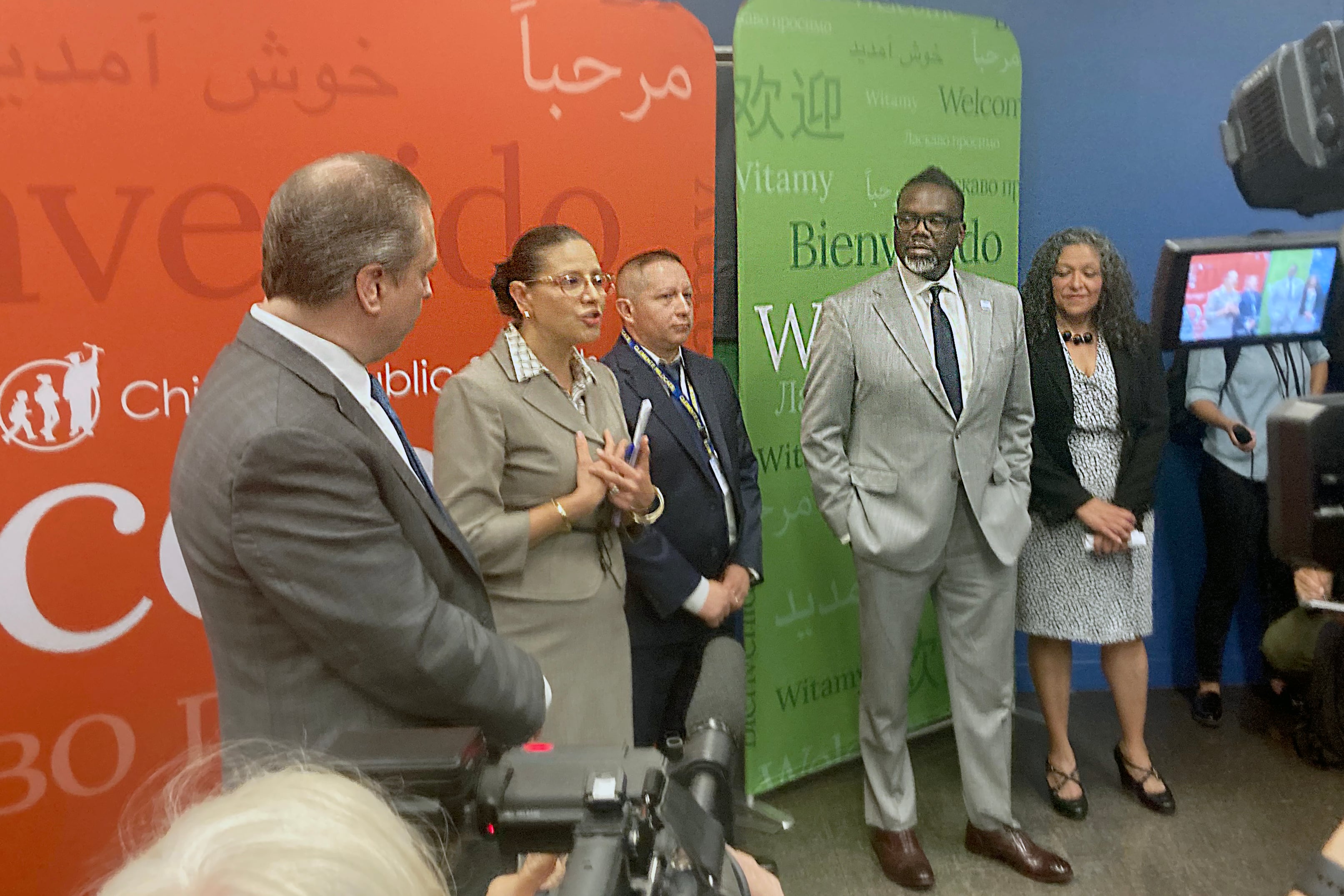Sign up for Chalkbeat Chicago’s free daily newsletter to keep up with the city’s public school system and statewide education policy.
Recently arrived migrant families on Chicago’s West Side will get help with enrolling in school, receiving free school supplies, signing up for public benefits, and getting vaccinated at a new “welcome center” run by Chicago Public Schools and the city.
Mayor Brandon Johnson and city and district officials unveiled the new center at Roberto Clemente Community Academy, a high school in the city’s Humboldt Park neighborhood, on Monday. Officials said the center is a pilot effort — possibly the first of several such facilities across the city.
They also called it a centerpiece of a broader plan they have promised for better serving migrant families across the city, though the center will only help smooth the transition into the district for those living in the Humboldt Park and West Town neighborhoods.
The center, which will work with families by appointment only starting later this week, is estimated to cost roughly $750,000, according to CPS CEO Pedro Martinez, who described it as a “very small investment” from the district’s operating budget.
More than 10,000 migrants have arrived in Chicago since August, many sent on buses from Texas by Republican Gov. Greg Abbott. Roughly half are staying in temporary shelters, including police stations. Hundreds of school-aged children are among the new arrivals, though the school district has not shared exact numbers. Helping these families find permanent housing and easing children into local public schools are key challenges facing the Johnson administration.
The Chicago Teachers Union, which helped carry Johnson — a former union organizer — to victory in April, had criticized district officials for not doing more to support newly arrived migrant students. Union leaders said some schools were overwhelmed by an influx of such students and scrambled to provide translation and other basic services.
District leaders have said they were working on a detailed, comprehensive plan for helping migrant students, to be released before the first day of school on Aug. 21. That bigger plan is still to come, Martinez said Monday.
Johnson said the area around Clemente was one of the city’s most densely populated with newcomer immigrants.
“We’re going to stand on the shoulders of our ancestors, and we’re going to bring people closer together to make sure that the families who have been here have the full force of government and families who wish to call Chicago their home also have the full force of government,” Johnson said at the Monday press conference.
Martinez balked at saying exactly how many migrant students enrolled in the district this past school year — it’s in the thousands, he said — or how many the district expects to serve in the fall. That latter number is too fluid, he said, but he promised to have an update at the start of the school year.
Johnson said his office will track “outcomes with this center” in order to improve how it operates and also use it as a model to potentially expand to other neighborhoods.
At the new “welcoming center” on the high school’s second floor, families will make their way through several classrooms to get a string of services, officials said. Children will get an English language screening, receive free supplies, and get assigned to a school.
Martinez said the high school students will be assigned to Clemente while younger children will be enrolled at one of eight nearby elementary schools — Chopin, De Diego LaSalle II, Mitchell, Moos, Pritzker, Sabin, and Talcott.
“These are migrant families who come here to seek their dream, and we’ll be part of that dream,” said Martha Valerio, the community coordinator at Clemente, standing in front of a table piled with coats, running shoes, and backpacks. “We are all going to receive them with a warm smile.”
Families will meet with a social worker and get help signing up for medical, dental appointments, and public benefits, such as food assistance and Medicaid.
“These are the types of services we have to provide across the entire city,” Johnson told journalists in front of the center.
According to WBEZ, some migrants are now living in tents, rather than police stations or crowded shelters, as they wait for permanent housing. School-aged migrant children are eligible to be classified as Students in Temporary Living Situations – a status that protects children without permanent housing.
Meanwhile, some teachers have been volunteering their time this summer to get students ready for school.
Earlier this month, the police department opened an investigation into sexual misconduct allegations against officers, including one accused of impregnating a recently-arrived teen, at a west side police station. The investigation prompted city officials to move migrants out of police stations.
Johnson said at the Monday event that the investigation is ongoing, with an update slated for Tuesday.
Reema Amin contributed.
Mila Koumpilova is Chalkbeat Chicago’s senior reporter covering Chicago Public Schools. Contact Mila at mkoumpilova@chalkbeat.org.






